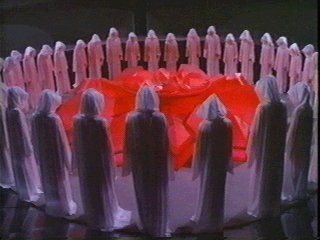Roundabout
 No, they're not about to go Jell-o wrestling, nothing so fun as that.
No, they're not about to go Jell-o wrestling, nothing so fun as that.Yesterday was my day off and Jim's on vacation so naturally we were watching Logan's Run--yes, we own it on DVD, and yes, I know it's a bad movie, so that'll be quite enough about that, thank you--and there's this event in the movie called Carousel, which would take much longer to explain than it's worth, and naturally I began to wonder if "carousel" and "carouse" were related, since I wonder that about any two words that share more than a couple of letters in common, don't I?
Amazingly, no relationship at all, none: they're even from different languages. You might guess that "carousel" is from French, and if you did that, you'd be right: they stole it from Italian "carosello", a jousting match, and renamed it "carrousel", which is a spelling that is still occasionally seen in English, though "carousel" is much more common. And what's a carousel? A bunch of horses! They may be made of painted wood (or, nowadays, fibreglass), but moving horses they still are.
"Carouse", on the other hand, is, stunningly, from German "gar aus". "Gar" means "all" (it's also seen in a phrase I remember from university German classes, "gar nicht", "not at all"), and "aus" means "out", as in "Ausländer", "foreigner", literally "outlander" (and compare this with "outlandish"). "Gar aus", therefore, means "all out", which is what you go when you're out carousing.

0 Comments:
Post a Comment
<< Home